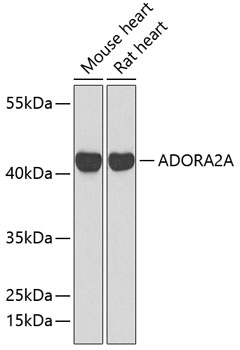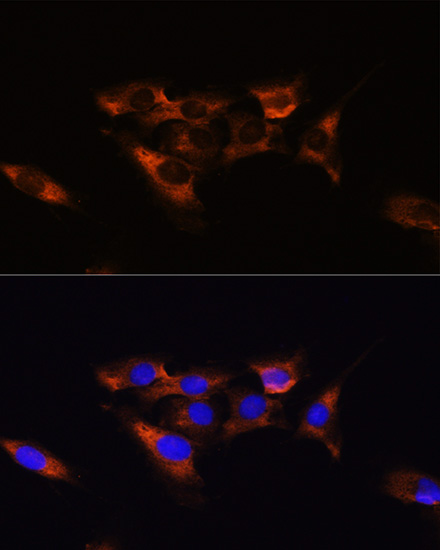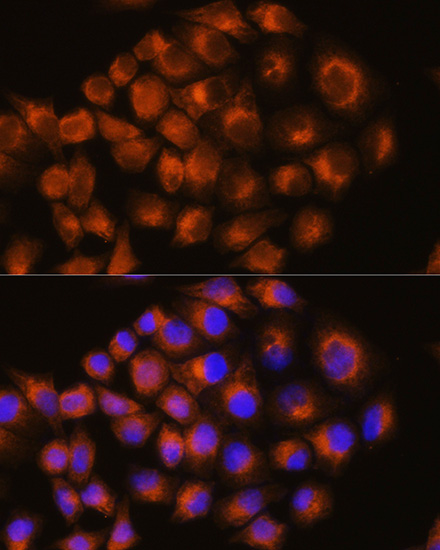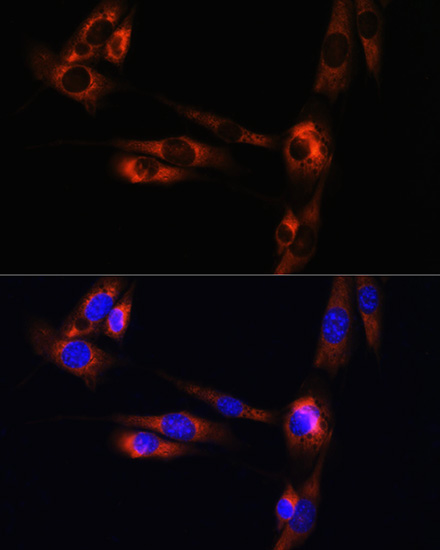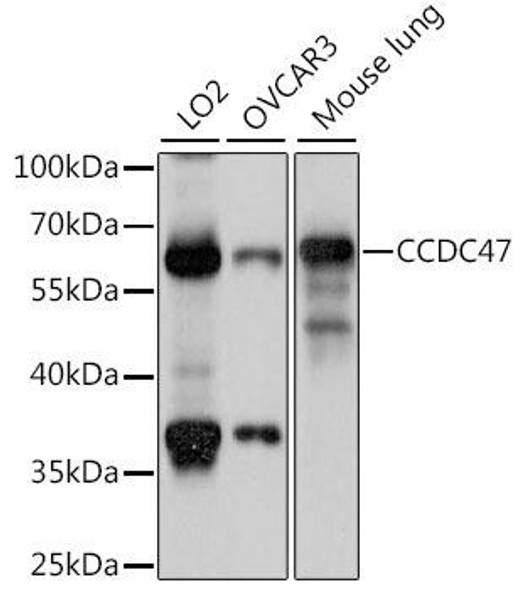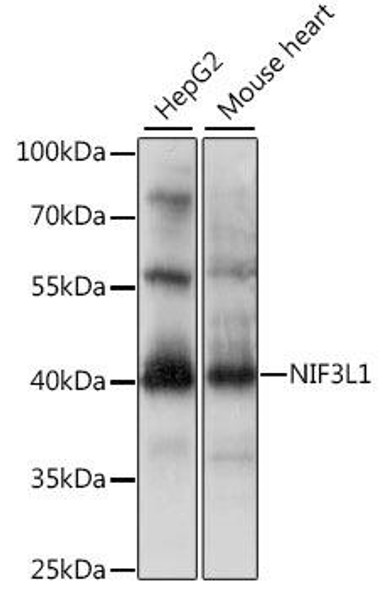Cell Biology Antibodies 6
Anti-ADORA2A Antibody (CAB1587)
- SKU:
- CAB1587
- Product Type:
- Antibody
- Reactivity:
- Human
- Reactivity:
- Mouse
- Reactivity:
- Rat
- Host Species:
- Rabbit
- Isotype:
- IgG
- Antibody Type:
- Polyclonal Antibody
- Research Area:
- Cell Biology
Description
| Antibody Name: | Anti-ADORA2A Antibody |
| Antibody SKU: | CAB1587 |
| Antibody Size: | 20uL, 50uL, 100uL |
| Application: | WB IF |
| Reactivity: | Human, Mouse, Rat |
| Host Species: | Rabbit |
| Immunogen: | A synthetic peptide corresponding to a sequence within amino acids 100-200 of human ADORA2A (NP_000666.2). |
| Application: | WB IF |
| Recommended Dilution: | WB 1:500 - 1:1000 IF 1:50 - 1:200 |
| Reactivity: | Human, Mouse, Rat |
| Positive Samples: | Mouse heart, Rat heart |
| Immunogen: | A synthetic peptide corresponding to a sequence within amino acids 100-200 of human ADORA2A (NP_000666.2). |
| Purification Method: | Affinity purification |
| Storage Buffer: | Store at -20'C. Avoid freeze / thaw cycles. Buffer: PBS with 0.02% sodium azide, 50% glycerol, pH7.3. |
| Isotype: | IgG |
| Sequence: | IDRY IAIR IPLR YNGL VTGT RAKG IIAI CWVL SFAI GLTP MLGW NNCG QPKE GKNH SQGC GEGQ VACL FEDV VPMN YMVY FNFF ACVL VPLL LMLG VYLR I |
| Gene ID: | 135 |
| Uniprot: | P29274 |
| Cellular Location: | Cell membrane, Multi-pass membrane protein |
| Calculated MW: | 44kDa |
| Observed MW: | 45kDa |
| Synonyms: | ADORA2A, A2aR, ADORA2, RDC8 |
| Background: | This gene encodes a member of the guanine nucleotide-binding protein (G protein)-coupled receptor (GPCR) superfamily, which is subdivided into classes and subtypes. The receptors are seven-pass transmembrane proteins that respond to extracellular cues and activate intracellular signal transduction pathways. This protein, an adenosine receptor of A2A subtype, uses adenosine as the preferred endogenous agonist and preferentially interacts with the G(s) and G(olf) family of G proteins to increase intracellular cAMP levels. It plays an important role in many biological functions, such as cardiac rhythm and circulation, cerebral and renal blood flow, immune function, pain regulation, and sleep. It has been implicated in pathophysiological conditions such as inflammatory diseases and neurodegenerative disorders. Alternative splicing results in multiple transcript variants. A read-through transcript composed of the upstream SPECC1L (sperm antigen with calponin homology and coiled-coil domains 1-like) and ADORA2A (adenosine A2a receptor) gene sequence has been identified, but it is thought to be non-coding. |
| UniProt Protein Function: | ADORA2A: one of several receptor subtypes for adenosine. A G-protein coupled receptor. Activation is mediated by G proteins which activate adenylyl cyclase. Abundant in basal ganglia, vasculature and platelets and it is a major target of caffeine. |
| UniProt Protein Details: | Protein type:Receptor, GPCR; Membrane protein, integral; GPCR, family 1; Membrane protein, multi-pass Chromosomal Location of Human Ortholog: 22q11.23 Cellular Component: integral to plasma membrane; membrane; plasma membrane Molecular Function:adenosine receptor activity, G-protein coupled; enzyme binding; identical protein binding; protein binding Biological Process: adenosine receptor signaling pathway; adenylate cyclase activation; apoptosis; blood circulation; blood coagulation; cAMP biosynthetic process; cell-cell signaling; cellular defense response; cellular protein metabolic process; central nervous system development; G-protein signaling, coupled to cAMP nucleotide second messenger; inflammatory response; nerve growth factor receptor signaling pathway; phagocytosis; sensory perception; transmembrane receptor protein tyrosine kinase signaling pathway |
| NCBI Summary: | This gene encodes a member of the guanine nucleotide-binding protein (G protein)-coupled receptor (GPCR) superfamily, which is subdivided into classes and subtypes. The receptors are seven-pass transmembrane proteins that respond to extracellular cues and activate intracellular signal transduction pathways. This protein, an adenosine receptor of A2A subtype, uses adenosine as the preferred endogenous agonist and preferentially interacts with the G(s) and G(olf) family of G proteins to increase intracellular cAMP levels. It plays an important role in many biological functions, such as cardiac rhythm and circulation, cerebral and renal blood flow, immune function, pain regulation, and sleep. It has been implicated in pathophysiological conditions such as inflammatory diseases and neurodegenerative disorders. Alternative splicing results in multiple transcript variants. A read-through transcript composed of the upstream SPECC1L (sperm antigen with calponin homology and coiled-coil domains 1-like) and ADORA2A (adenosine A2a receptor) gene sequence has been identified, but it is thought to be non-coding. [provided by RefSeq, Jun 2013] |
| UniProt Code: | P29274 |
| NCBI GenInfo Identifier: | 543740 |
| NCBI Gene ID: | 135 |
| NCBI Accession: | P29274.2 |
| UniProt Secondary Accession: | P29274,B2R7E0, |
| UniProt Related Accession: | P29274 |
| Molecular Weight: | |
| NCBI Full Name: | Adenosine receptor A2a |
| NCBI Synonym Full Names: | adenosine A2a receptor |
| NCBI Official Symbol: | ADORA2A |
| NCBI Official Synonym Symbols: | A2aR; RDC8; ADORA2 |
| NCBI Protein Information: | adenosine receptor A2a |
| UniProt Protein Name: | Adenosine receptor A2a |
| Protein Family: | Adenosine receptor |
| UniProt Gene Name: | ADORA2A |
| UniProt Entry Name: | AA2AR_HUMAN |


